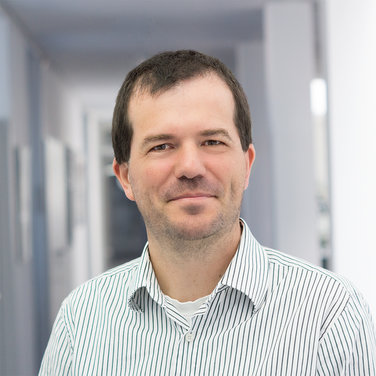ACTRESS
Cooperative Shipping and Navigation on Sea
The ACTRESS project develops and provides new methods for the complete virtual design and the verification and validation of complex highly automated maritime Systems-of-Systems (SoS), as well as a physical mobile platform with sensors, network and bridge systems. This means in detail new architectures for secure maritime SoS, approaches for the simulation and physically-based verification of highly automated maritime SoS, and finally approaches for the safety validation of connected maritime SoS. More ...
- Project duration: 01.09.2017 – 31.12.2020
- Funded by the German Federal Ministry for Economic Affairs and Energy (BMWi)
AMISIA
Advanced Port Maintenance: Intelligent, Sustainable, Innovative and Automated Dredging
The primary goal of this project is to strengthen the sustainable cost-effectiveness of port maintenance by automating the cost-intensive maintenance dredging to a large extent. The core idea of the project is to design, verify, validate and test a dredger vessel for the recirculation process that is automated in three automation levels in order to assess the automation and service risks of operating such a vessel in the port. More ...
- Project duration: 01.10.2021 - 30.09.2024
- Funded by the Federal Ministry of Transport and Digital Infrastructure (BMVI)
AVATAR
Sustainable urban transport with autonomous zero-emission vessels
The AVATAR project is committed to emission-free, autonomous inland waterway transport for freight transport in cities, e.g. on canals. The modular autonomous vessels are monitored by a shore side Control Center (SCC) and can be remotely controlled in critical situations. The aim is to use the less used inland waterways for the distribution of palletized goods with waste recycling. Pilot cities for this project are Ghent, Leuven, Hamburg and Delft. The eMIR testbed supports the project by using its own communication infrastructure and a SCC for remote control and observation. The project serves to demonstrate the use of eMIR also in inland navigation and supports the development in verification and validation. More ...
- Project duration: 01.05.2020-30.06.2023
- Funded by the EU Interreg North Sea Region as part of the theme green transport and mobility.
COSINUS
To arrange a consultation or workshop, contact us.
The COSINUS project develops the integration of navigation systems on ship bridges with vessel traffic service (VTS) systems ashore. This is to be achieved through improved data exchange and better integration of ship and shore data using broadband communication. These new means of communication will be evaluated in order to create a common picture of the situation on ships and ashore, and thus support safe VTS despite constantly increasing traffic density. Using the eMIR testbed, the project demonstrates the aggregation and distribution of information from different sensors together with exchanged routes and intended maneuvers over a VHF/LTE communication link.
- Project duration: 01.11.2013 – 31.10.2015
- Funded by the German Federal Ministry for Economic Affairs and Energy (BMWi)
CSE
Interdisciplinary Research Center on Critical Systems Engineering for Socio-Technical Systems
Safety-critical systems are computer-based systems whose failure through human error, technical malfunction, and malicious manipulation of information can cause catastrophic events leading to the loss of human life or drastic economic consequences. They have long been irreplaceable components of numerous economic sectors, they form the technological backbone of today's society, and are an integral part of various industries such as the automotive industry, aerospace, marine technology, automation, energy supply, health care, and banking. These systems thus represent a critical basic technology whose engineering development, due to the socio-technical character of the systems, requires an interdisciplinary approach that goes far beyond the classical engineering disciplines.
The CSE Research Center investigates the role of humans in the control of complex transport systems on land and at sea. The focus is on units of socio-technical systems in the transport sector where the overall objective is safe and environmentally friendly mobility through cooperative semi-autonomous guidance of vehicles with humans in the loop, e. g. in their role as driver, operator, navigator, air traffic controller, etc. Two industrial sectors in Lower Saxony are considered key areas, the automotive and the maritime sector. The CSE funded the initial setup and development of the concepts for eMIR.
- Project duration: 01.04.2013 – 31.12.2016
- Funded by the Niedersächsisches Ministerium für Wissenschaft und Kultur (MWK)
EASE
AI-based assistance for forensic investigations at sea
In the EASE project, innovative AI procedures with completely new assistance and interaction technologies are being researched and evaluated in order to significantly improve the efficiency of forensic investigation activities in the maritime sector and, in particular, to drastically increase the detection rate in time-critical cases. Although there are existing systems, these are merely non-optimized tools. The aim is to design task-oriented interaction concepts that support maritime actors in specific situations. The current state of the art has developed to such an extent that such systems cannot be put into operation directly, but must be fundamentally researched with regard to their functional design and possible application in the maritime sector. The knowledge gained will potentially benefit all authorities and organizations with safety and security tasks, national and international security centers and commercial actors such as shipping companies or operators of maritime infrastructures.
- Project duration: 01.11.2019 – 30.04.2022
- Funded by the German Federal Ministry for Economic Affairs and Energy (BMWi)
ENABLE-S3
European Initiative to Enable Validation for Highly Automated Safe and Secure Systems
The main objective of ENABLE-S3 is the establishment of cost-effective, cross-domain virtual and semi-virtual verification and validation (V&V) platforms and methods for highly automated and autonomous cyber-physical systems (ACPS). Advanced functional, safety and security test methods are developed to significantly reduce V&V time while maintaining test validity for the required high operating range. With regard to the maritime sector, simulation capabilities that will allow the System Under Test (SUT), i. e. the Shore-Based-Bridge (SBB) including route planning, monitoring and ship control systems, to function efficiently in a Test System (TS), i. e. a co-simulator, will be developed and investigated within the maritime use case (UC10) of the ENABLE-S3 initiative. Appropriate ship-to-shore communication systems are essential.
- Project duration: 01.05.2016 - 30.04.2019
- Funded by the German Federal Ministry of Education and Research (BMBF); ECSEL Joint Undertaking
Based on comprehensive data analysis, the HANSA project offers an innovative function for checking route planning: Recommended Corridors. Existing functions for checking route planning errors are based solely on static information and do not take into account past experience and practices. HANSA validates the currently planned route on the basis of information about routes that have been successfully navigated by similar ships in the past. The environmental context, e. g. wind and water currents, is also considered. HANSA offers navigators support in planning and implementing the voyage with the recommended corridors. If, for example, storms or unexpected environmental events should obstruct the waterways or common routes, the resulting change in traffic flow can be recognized and included in adapted corridor recommendations for ships sailing in this area in the near future. Recommended corridors can also be used in VTS centers to check anomalies in vessel movements. This will improve the situational awareness of their monitored traffic area by enabling them to better predict or anticipate traffic events. More ...
- Project duration: 01.06.2018 - 31.05.2020
- Funded by the German Federal Ministry for Economic Affairs and Energy (BMWi), MarTERA.
INTELLIMAR
Intelligent assistance and analysis systems for early detection and management of maritime hazardous situations
The overall goal of the IntelliMar project is to analyze new concepts and future services in the field of intelligent data analysis within the framework of industrial research, and to contribute to a significant improvement of existing concepts and processes. Thus, the project is part of a holistic view of an innovative overall architecture for the increasingly complex requirements of maritime use cases – especially with regard to maritime safety. The research assignments primarily comprise an innovative sub-aspect of an overall architecture. The situation awareness of decision-makers and task forces in crisis or dangerous situations is to be improved by providing them with reliable and situation-specific information at the right time in a better way than before (higher degree of digitalization and automation). This approach supports users both in decision-making and in the implementation of measures, and ultimately serves to increase the response capability and protection of the personnel involved.
- Project duration: 01.09.2018 - 28.02.2021
- Funded by the German Federal Ministry of Economic Affairs and Energy (BMWi)
The KEI.POP project aims to improve maritime safety by developing a new support system for pilots that will allow up-to-date shore-based information to be transferred to a ship without data loss or delay, even at low data rates. The Portable Pilot Unit (PPU) supports the pilot with charts and important information about ships and ports. The information is received on the PPU via radio communication. Due to the lack of broadband network coverage of the waterways, the displayed picture of the current traffic situation is often delayed. KEI.POP closes this gap by significantly improving the stability of ship-to-shore communications compared to established technologies through the Maritime Connectivity Platform (MCP), which standardizes Internet technologies specifically for maritime applications. Pilots and nautical personnel on board have access to current situation pictures, and in future they will also have access to prevailing hydrographic and meteorological conditions or information about the subsequent logistics chain. In addition, during pilotage, a shore-based radar image can be transmitted from a vessel traffic service center to a PPU – without data loss, in real time, and according to MCP standards. More ...
- Project Duration: 01.10.2016 - 30.04.2020
- Funded by the German Federal Ministry for Economics and Energy (BMWi) under the ZIM funding programme and the EUREKA research initiative.
MTCAS
Maritime Traffic Alert and Collision Avoidance System
The MTCAS project develops a technical collision avoidance system for shipping, similar to the collision avoidance system used in aviation, called Traffic Alert and Collision Avoidance System (TCAS), which informs the pilot of an aircraft about approaching targets within defined temporal and spatial limits and generates corresponding alarms. A similar system is being developed for shipping, which uses all available information from current positions, planned routes, knowledge databases and historical tracking data to provide earlier and more accurate predictions and suggestions for avoiding possible collisions. The MTCAS system serves as a decision support component for on-board and land-based collision avoidance in shipping. It does not automatically intervene in the steering of a ship, but supports the navigators in finding safe and efficient evasive maneuvers. MTCAS consists of two main technical components: collision detection and collision resolution. It is one of the most tested systems to gain research experience and results in the eMIR testbed.
- Project duration: 01.01.2016 – 31.12.2018
- Funded by the German Federal Ministry for Economic Affairs and Energy (BMWi).
SMARTKAI
Assistance system to prevent damage to ships and port infrastructure
The aim of the SmartKai project is to develop a ship-independent assistance system that will be installed at the port infrastructure to prevent and minimize damage to ships and in ports. On the basis of innovative, locally distributed, and laser-based digital sensor technology, the assistance system is to create a consistent and standardized situation picture for different target groups. A prototype is to prevent ship accidents and damage to port infrastructure. In addition, the causes of any damage that occurs can be identified directly, and it will be a major step forward to also identify their causes, counteract them, and eliminate them. In the course of the project, eMIR will be extended to the ports of Wilhelmshaven and Cuxhaven and these will be equipped with further eMIR-relevant technology. More ...
- Project duration: 01.12.2019 - 30.11.2022
- Funded by the German Federal Ministry of Transport and Digital Infrastructure (BMVI), Projektträgerschaft Innovative Hafentechnologien
STEP-UP!CPS
Software methods and technologies for modular updates of Cyber-Physical Systems
Within the scope of the project Step-Up!CPS, a concept is developed that covers the complete update cycle of safety-critical CPS. It includes the model-based function development and compatibility check at the manufacturer, the secured import of updates and checking of the security features as well as the monitoring at runtime in order to be able to return the information to the manufacturer in case of errors. The necessary services are integrated into a middleware, which is developed domain-agnostically. The developed solutions will be prototypically demonstrated in use cases from the automotive, maritime and industry domain. Within the maritime use case it is investigated how a highly automated assistance system for navigation in dense sea areas can be updated after commissioning on the ship, e. g. for troubleshooting, without having to perform a complete type test of the bridge system or even the corresponding ship again.
- Project duration: 01.10.2018 - 30.09.2021
- Funded by the German Federal Ministry of Education and Research (BMBF)
GET IN TOUCH
To arrange a consultation or workshop, contact us.


Head of Department

Head of Group